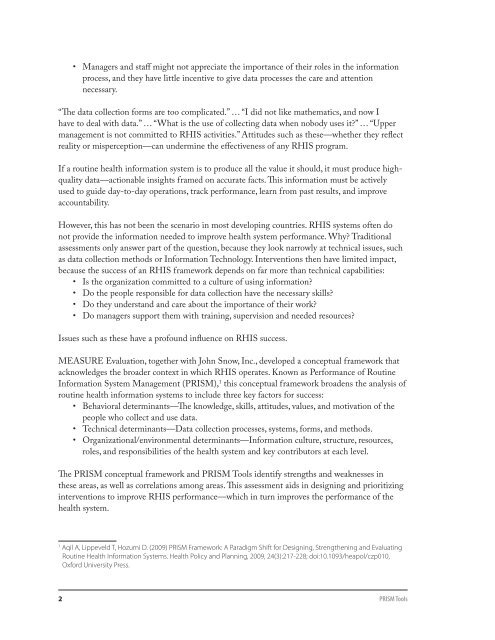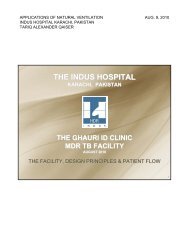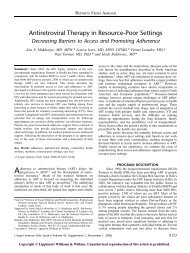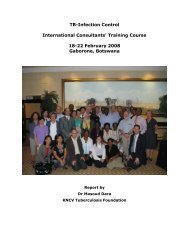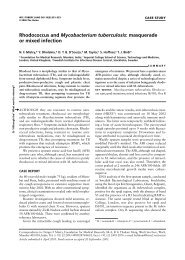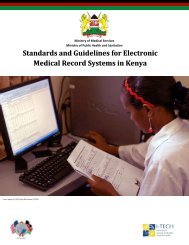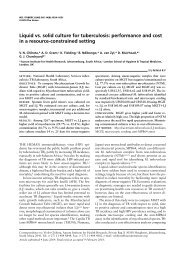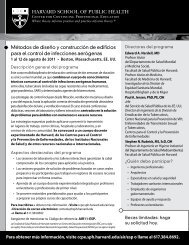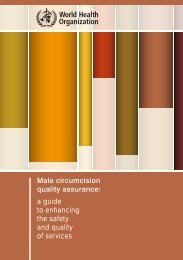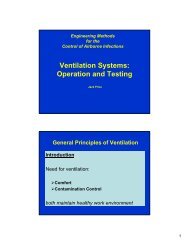PRISM_DescriptionOfTools.pdf - GHDonline
PRISM_DescriptionOfTools.pdf - GHDonline
PRISM_DescriptionOfTools.pdf - GHDonline
You also want an ePaper? Increase the reach of your titles
YUMPU automatically turns print PDFs into web optimized ePapers that Google loves.
• Managers and staff might not appreciate the importance of their roles in the information<br />
process, and they have little incentive to give data processes the care and attention<br />
necessary.<br />
“The data collection forms are too complicated.” … “I did not like mathematics, and now I<br />
have to deal with data.” … “What is the use of collecting data when nobody uses it?” … “Upper<br />
management is not committed to RHIS activities.” Attitudes such as these—whether they reflect<br />
reality or misperception—can undermine the effectiveness of any RHIS program.<br />
If a routine health information system is to produce all the value it should, it must produce highquality<br />
data—actionable insights framed on accurate facts. This information must be actively<br />
used to guide day-to-day operations, track performance, learn from past results, and improve<br />
accountability.<br />
However, this has not been the scenario in most developing countries. RHIS systems often do<br />
not provide the information needed to improve health system performance. Why? Traditional<br />
assessments only answer part of the question, because they look narrowly at technical issues, such<br />
as data collection methods or Information Technology. Interventions then have limited impact,<br />
because the success of an RHIS framework depends on far more than technical capabilities:<br />
• Is the organization committed to a culture of using information?<br />
• Do the people responsible for data collection have the necessary skills?<br />
• Do they understand and care about the importance of their work?<br />
• Do managers support them with training, supervision and needed resources?<br />
Issues such as these have a profound influence on RHIS success.<br />
MEASURE Evaluation, together with John Snow, Inc., developed a conceptual framework that<br />
acknowledges the broader context in which RHIS operates. Known as Performance of Routine<br />
Information System Management (<strong>PRISM</strong>), 1 this conceptual framework broadens the analysis of<br />
routine health information systems to include three key factors for success:<br />
• Behavioral determinants—The knowledge, skills, attitudes, values, and motivation of the<br />
people who collect and use data.<br />
• Technical determinants—Data collection processes, systems, forms, and methods.<br />
• Organizational/environmental determinants—Information culture, structure, resources,<br />
roles, and responsibilities of the health system and key contributors at each level.<br />
The <strong>PRISM</strong> conceptual framework and <strong>PRISM</strong> Tools identify strengths and weaknesses in<br />
these areas, as well as correlations among areas. This assessment aids in designing and prioritizing<br />
interventions to improve RHIS performance—which in turn improves the performance of the<br />
health system.<br />
1<br />
Aqil A, Lippeveld T, Hozumi D. (2009) <strong>PRISM</strong> Framework: A Paradigm Shift for Designing, Strengthening and Evaluating<br />
Routine Health Information Systems. Health Policy and Planning, 2009, 24(3):217-228; doi:10.1093/heapol/czp010,<br />
Oxford University Press.<br />
2 <strong>PRISM</strong> Tools


